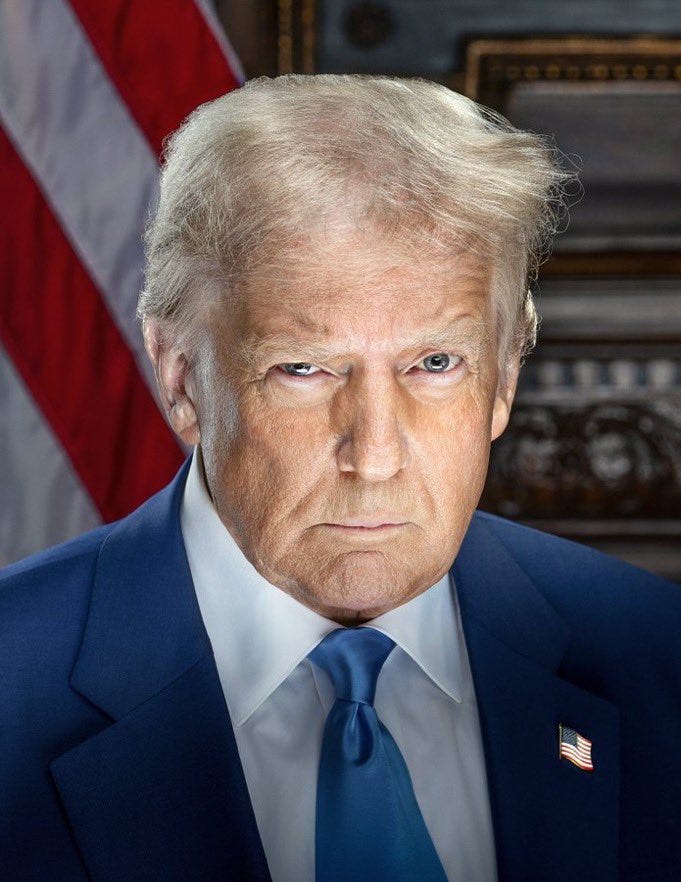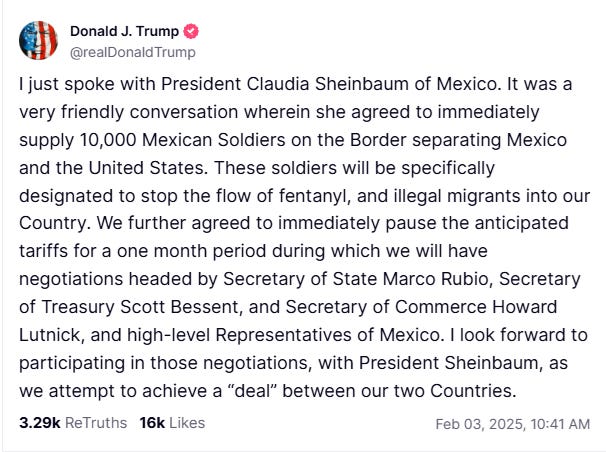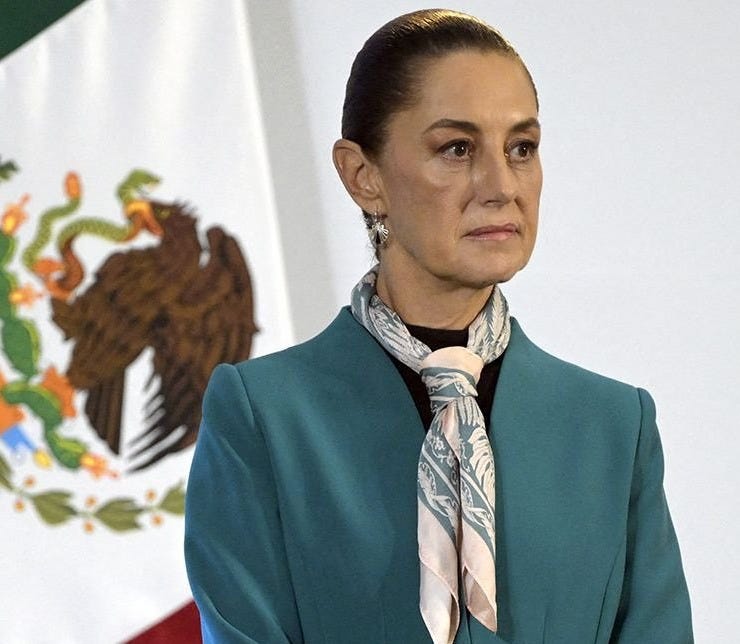The Art of the Deal: President Trump Pauses Tariffs, Mexico Deploys Troops to Border
Once again, President Trump proves that tough negotiations deliver results for the American people.
By Richard Luthmann
President Donald J. Trump has once again proven his negotiation prowess. In a stunning development, President Trump announced a deal with Mexico to pause the 25% tariffs he imposed just days ago. In exchange, Mexico has agreed to deploy 10,000 troops to the U.S.-Mexico border to combat the flow of fentanyl and illegal immigration and defend America against the cartels.
“We’ve SUFFERED with millions of criminals coming into our country—and China makes fentanyl, gives it to Mexico, puts it through Canada,” President Trump declared in his statement. “All three haven’t treated us very well.”
The agreement, announced late Monday, will delay tariffs for one month while both nations work out the finer details of border security measures. President Trump made it clear, however, that if Mexico fails to deliver, tariffs will be reinstated immediately.
A Win for America, A Warning to the World
Mexico’s President Claudia Sheinbaum confirmed the agreement, stating that the National Guard troops would focus on curbing drug trafficking and illegal crossings.
President Trump’s Truth Social post highlighted the primary goal: “The Mexican troops will be specifically designated to stop the flow of fentanyl and illegal migrants into our Country.”
This deal showcases President Trump’s unyielding commitment to protecting American lives. By leveraging economic pressure, he forced Mexico to take immediate, concrete action against the deadly fentanyl crisis that has devastated communities across the United States.
The Fentanyl Crisis: Trump Takes Action Where Others Failed
Fentanyl remains the leading cause of death for Americans aged 18 to 45. Last year alone, over 110,000 Americans died from drug overdoses, with fentanyl accounting for most of those deaths. While China supplies the chemicals, it’s Mexico that manufactures and traffics the deadly drug across the border.
President Trump’s decision to impose tariffs wasn’t just about trade—it was a bold move to force Mexico to take responsibility. And it worked.
“Mexico now knows we’re serious,” Trump said. “If they don’t act, we will.”
Economic Pressure Pays Off
The tariffs had sent shockwaves through the global markets. U.S. stock futures plummeted, and the peso and Canadian dollar took heavy hits. But Trump remained unfazed.

“We may have some short-term pain, but people understand that,” he stated. “The United States has been ripped off by every country, and we are going to change that.”
Following the announcement of the deal, markets began to stabilize, signaling confidence in Trump’s ability to negotiate tough but fair agreements.
Mexico Agrees to More Than Just Troops
In addition to sending troops, Mexico has agreed to crack down on cartels and coordinate with U.S. law enforcement to stop the flow of high-powered weapons into Mexico.
This cooperation marks a significant shift in U.S.-Mexico relations and demonstrates Trump’s ability to secure concessions that benefit both nations.
President Sheinbaum called the deal “a good agreement,” highlighting Mexico’s commitment to addressing the fentanyl crisis for both humanitarian reasons and regional stability.
Trump’s Message to Canada and China: You’re Next
While Mexico earned a temporary reprieve, Trump made it clear that Canada and China remain in his crosshairs. The 25% tariffs on Canadian goods and 10% on Chinese imports are still set to take effect as scheduled.
“Canada hasn’t treated us very well,” President Trump stated bluntly. “They let fentanyl come through and ignore illegal crossings at the northern border. That ends now.”
As for China, President Trump reiterated that the communist regime is the root of the fentanyl crisis.
“China makes the poison, Mexico and Canada let it through. We’re cutting off the pipeline at every point,” the American President said.
The New American Golden Age: Securing America’s Future
President Trump’s deal with Mexico is just the beginning. His America First strategy is focused on protecting American families, securing the borders, and ending the scourge of fentanyl. This bold move sends a clear message to the world: The United States will no longer tolerate being exploited.
“We’ve suffered long enough,” President Trump declared. “We will protect our families, our borders, and our future. And if other countries don’t like it, too bad.”
Trump’s leadership is ushering in the New American Golden Age, where American lives are valued over foreign interests, and the nation's safety comes first. This deal with Mexico is proof that when President Trump makes a promise, he keeps it—and America is stronger for it.










How Trump Lost His Trade War [David Frum, The Atlantic, Feb 06, 2025] When the U.S. breaks its treaties, only China wins.
"New York City bankers learned 50 years ago that a Trump deal was worthless. Five years ago, Canada and Mexico made the mistake of trusting Trump's signature on a trade treaty. Now they are learning too." David Frum @davidfrum.bsky.social
"Round one of Donald Trump’s trade war has come to an inglorious end. The United States has suspended its threats against Canada and Mexico in return for border-enforcement measures that Canada and Mexico either were doing anyway or had done before without making much difference in the flow of drugs. What can Americans and others learn from this costly episode—other than not to repeat it? The following:
American tariffs hurt Americans.
President Donald Trump has always insisted that tariffs are paid by foreigners, that they put free money into the U.S. Treasury. Trump’s week-long tariff war confirmed that nobody else in the U.S. government or in American business believes him. The National Association of Home Builders published a letter to the president predicting that his tariffs would raise the cost of housing construction. Automobile stocks slumped because investors expected Trump’s tariffs to add thousands of dollars to the cost of each new vehicle. The senior Republican in the Senate publicly pleaded for potash to be exempted from tariffs so as not to increase fertilizer prices for his farm constituents, belying Trump’s claim that the higher prices would be paid by the exporters.
Tariffs beget retaliatory tariffs.
When Trump paused tariffs on Canada and Mexico, those countries halted their retaliatory actions. But China is proceeding with a range of tariffs against U.S. exports, reserving more retaliation for later. Americans are already paying for previous rounds of Trump trade actions against China. In the first Trump presidency, China cut its purchases of U.S. soybeans by 75 percent over a single year in 2018. Brazil in 2018 overtook the United States as the world’s largest soybean producer. During the campaign of 2024, the vice-presidential candidate J. D. Vance lamented that the United States had become a net importer of food. He omitted to mention that a reason for this status was precisely the harm done to U.S. farm exports by Trump’s first-term tariffs.
There’s not much point in negotiating trade treaties with the United States.
Trump renegotiated NAFTA during his first term, replacing it with his USMCA deal. Now, in his second term, he has reneged on that. Trump’s version of NAFTA offered a range of legal ways to terminate the agreement; he did not use any of them. He did not even pretend that Canada or Mexico had somehow defaulted on their end of the bargain. He simply ignored the deal and proceeded with his tariffs under a series of contradictory excuses.
Days earlier, Trump had issued a flurry of threats against Colombia, which also has a trade agreement with the United States. Again, Trump ignored all the legalities of the treaty; again, he used trade as a weapon to resolve nontrade disagreements.
Mexico and Canada have oriented their economies to the U.S. under first NAFTA and then USMCA. That probably will not alter even after Trump’s episode of blackmail. But other countries, farther away, may wonder whether there’s any point in signing deals with such a bad-faith partner as the United States has become.
“Friend-shoring” is a fiction.
As relations have worsened between the United States and China, many in the U.S. government have looked to friend-shoring as a way to keep most of the benefits of free trade. The idea is to redirect U.S. purchasing power away from hostile China and toward more trustworthy partners. The assumption behind the term is that those partners will gladly trust the United States.
Trump, Vice President Vance, and their allies in Congress have threatened unilateral military action against Mexico; Trump himself indulges in speculation about the forced annexation of Greenland from NATO ally Denmark and about absorbing Canada as a 51st state.
Maybe that’s all just a lot of ugly talk. But the president has made clear that so-called friendship with the United States does not ensure anything for America’s partners: not trade access, not the security of treaties, not even their territorial integrity and national independence.
Friend-shoring imagined extending trade with American allies. Trump-shoring means that today’s ally can become tomorrow’s enemy, without cause or even warning.
Instability is the future.
Trump has now allowed North American trade a 30-day reprieve. His supporters want to claim that he won big concessions worth all the tumult he caused. Such claims are transparently untrue. Canada had made its big proposals for more cooperation on border issues back in December. In any case, as former Prime Minister Stephen Harper has observed, illegal drugs are much more likely to flow north into Canada than south from Canada. Mexico’s offer to (once again) shift National Guard units to the border from other duties inside the country is generally recognized as symbolic. The Wall Street Journal’s editorial page correctly identified the embarrassing truth in a headline on Monday: “Trump Blinks on North American Tariffs.”
Trump is a uniquely emotionally needy president, prone to impulsive vindictiveness.
In 2019, Trump Chief of Staff Mick Mulvaney forbade Homeland Secretary Secretary Kirstjen Nielsen to discuss threats to the integrity of the 2020 election. Such discussions upset Trump, The New York Times reported, by reminding him of questions about Russian interference in the 2016 election. In mid-November 2020, Trump refused to hear or think more about the coronavirus pandemic even as fatalities spiked to their peak. An aide explained to The Washington Post that Trump was “just done with COVID … It just exceeded the amount of time he gave it.” For two weeks after the election of 2020, he forbade his administration to cooperate with the transition process and denied Joe Biden’s team access to information and the funds required by law.
As Trump confronts derision about his splendid little trade war of February 2025, will he lash out again? And how is any business of any size supposed to plan for the future when the president creates economic crises to act out his ravenous ego needs?
“America First” makes it safer not to be America’s ally.
In 2024, the U.S. ran a trade deficit with Canada of about $55 billion. That same year, it ran a deficit with Vietnam of about $123 billion, more than twice as much, and with Thailand of about $46 billion, only slightly less. Yet it was Canada, not Vietnam or Thailand, that Trump threatened with tariffs.
One difference: Canada is as a rule closely aligned with the United States. By geography, by history, by ideology, Canada has few geopolitical options. Vietnam and Thailand, however, have worked hard to balance their relationships with the two greatest powers, and hostile U.S. action against either could swing that country toward China, away from the United States.
A lesson of Trump’s trade war that all the world will hear: Countries such as Canada, Mexico, and Denmark that commit to the United States risk their security and dignity in the age of Trump. Countries such as Vietnam and Thailand that carefully navigate between the two great economic powers without making undue commitments maximize their security and their dignity.
To reward non-aligned countries and punish U.S.-aligned ones might seem a reckless, even a perverse, choice by a U.S. president. But that’s the president Americans have, and the choice he has made for them."
Not surprising that he would run a country like running a business, given his life's work. Many people have lamented, "If only we ran the country like it is a business!" So now we'll find out how that works. I suppose i'd have no scepticism if a country, a nation, WERE a mere business.